Margaret Robison's Blog
October 31, 2008
Celebrating Chris
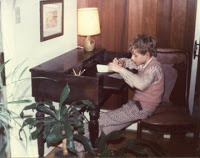
Chris the writer
My son Christopher Robison—now Augusten Burroughs—was born October 23, 1965. I wrote the following poem on his 11th birthday:
CHRISTOPHER
There is a log he knows by heart and loves.
He brings me gifts—dried roots, puff balls,
An old bee hive. Less child
More boy, he goes
To follow woods’ trails.
Dried grasses scrape against his thighs
And branches bent swing back like doors.
He weighs stones in his hands, decides
Which ones to throw and watches
Shatterings of pine and hemlock on the lake,
Their gathering again to tree shapes,
Blues and greens.
Walking home he drags a spruce bough,
Hatchet strapped to his side
In a leather sheath and light
Moves on his lips like water.
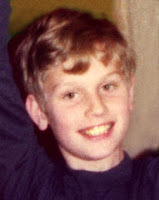
This poem was written in celebration of Chris and the tree house his father built for him:
TREE HOUSE
—in memory of John Robison
You drove nails into the wood. Sap flowed.
You fastened three planks to three tree trunks—a floor frame.
And covered it over with wood.
You built a wing-shape in the trees.
Hammered a ladder and braced it—
A gift for our son.
You told me the tree house won’t matter
A summer from now. He'll out grow it,
Abandon it long before tree growth
Forces the planking apart.
But tonight with his lantern he climbed
To his tree house and listened
To snapping twigs, crickets, dry leaves in a breeze.
Moon low in the branches and tree trunks.
The stream flowed. Our son
Knelt in his tree house, his face lit. He listened
To night sounds, and looked at the woods.
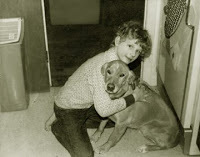
Published on October 31, 2008 15:35
October 24, 2008
look me in the eye
look me in the eye, written by my son John Elder, is his New York Times best-selling memoir about growing up with Asperger’s. It has now been released in paperback.
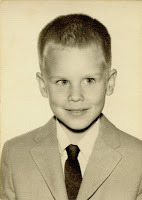
JOHN ELDER
This is John Elder, all dressed up for a school picture.
This is the boy, once a baby, whose first word was car.
A toddler who insisted on going to bed with his shoes on,
Who clutched an old toothpaste tube like a treasure.
Who delighted in the bright fall leaves in Philadelphia.
This is the boy who rode his sled on Mount Rainier’s base.
The boy who sat on a stone in Seattle and thought and thought.
Who was sad and puzzled because no one would play with him.
This is the boy who learned to ride his bike by pedaling
From his father to me and back again
Between the Heinz Chapel and the Cathedral of Learning
In Pittsburgh where his brother was born. This is the boy
Who was tender and loving with the baby.
The boy who camped in the woods in Massachusetts
And built his first car from parts found in a dump.
This is the boy who dropped out of high school to become
The man labeled, “The Electrical Wizard of KISS.”
Who designed talking toys for Milton Bradley, and worked
For electronics companies. The man who finally
Returned to his first love—cars.
Who created a business servicing, selling
And restoring them—Mercedes Benz, Rolls Royce,
Jaguar, BMW, Range Rover, Porsche. This is the boy
Who was born with Asperger’s Syndrome
Before it was called by that name, the boy
who became the man who wrote the book
Look Me in the Eye: My Life With Asperger’s.
This is my son.
Margaret Robison © 2007
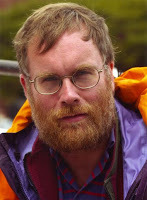
FIRST SON
—for John Elder
No hope, my neurologist said.
Lying in my hospital bed, my left side
lead-heavy, still as death,
I remembered you at three—
first child of a troubled marriage,
working to fix things—toy cars, trucks,
the family with its broken heart.
Bedtime, you’d ask me to read
The Little Engine that Could.
You never tired of hearing
that small engine’s uphill struggle.
I think I can, the engine puffed. I think I can.
Words coming back to me during my months
in the hospital as I struggled,
with my damaged brain and paralyzed limbs.
I thought of you—little boy
squatting on the floor, hunched over
a car or truck fiercely banging
with your bright wooden hammer
or twisting your make-believe wrench,
determination locked in your clenched jaw.
The same jaw now hidden by your thick beard
that flashes so red in the sunlight.
Margaret Robison ©2006
Photograph by Jack Robison ©2006

JOHN ELDER
This is John Elder, all dressed up for a school picture.
This is the boy, once a baby, whose first word was car.
A toddler who insisted on going to bed with his shoes on,
Who clutched an old toothpaste tube like a treasure.
Who delighted in the bright fall leaves in Philadelphia.
This is the boy who rode his sled on Mount Rainier’s base.
The boy who sat on a stone in Seattle and thought and thought.
Who was sad and puzzled because no one would play with him.
This is the boy who learned to ride his bike by pedaling
From his father to me and back again
Between the Heinz Chapel and the Cathedral of Learning
In Pittsburgh where his brother was born. This is the boy
Who was tender and loving with the baby.
The boy who camped in the woods in Massachusetts
And built his first car from parts found in a dump.
This is the boy who dropped out of high school to become
The man labeled, “The Electrical Wizard of KISS.”
Who designed talking toys for Milton Bradley, and worked
For electronics companies. The man who finally
Returned to his first love—cars.
Who created a business servicing, selling
And restoring them—Mercedes Benz, Rolls Royce,
Jaguar, BMW, Range Rover, Porsche. This is the boy
Who was born with Asperger’s Syndrome
Before it was called by that name, the boy
who became the man who wrote the book
Look Me in the Eye: My Life With Asperger’s.
This is my son.
Margaret Robison © 2007

FIRST SON
—for John Elder
No hope, my neurologist said.
Lying in my hospital bed, my left side
lead-heavy, still as death,
I remembered you at three—
first child of a troubled marriage,
working to fix things—toy cars, trucks,
the family with its broken heart.
Bedtime, you’d ask me to read
The Little Engine that Could.
You never tired of hearing
that small engine’s uphill struggle.
I think I can, the engine puffed. I think I can.
Words coming back to me during my months
in the hospital as I struggled,
with my damaged brain and paralyzed limbs.
I thought of you—little boy
squatting on the floor, hunched over
a car or truck fiercely banging
with your bright wooden hammer
or twisting your make-believe wrench,
determination locked in your clenched jaw.
The same jaw now hidden by your thick beard
that flashes so red in the sunlight.
Margaret Robison ©2006
Photograph by Jack Robison ©2006
Published on October 24, 2008 15:26
June 14, 2008
Roses
Ilene Aune was born with a hole in her heart and lived with it until long after she married and was raising three daughters. Before having surgery, she told her daughters about the hole in her heart and that she was going to have an operation to fix it. They in turn told their friends. Ilene told me later that a concerned young friend of one of her daughters had asked her: “Mrs. Aune, can you love with a hole in your heart?”
I loved this story and encouraged Ilene to write it. She told me she thought she would write it as well as the story of her recovery from the surgery. But she never got around to doing that either. She was too busy expressing love. Not only did Ilene do more than anyone else I knew to welcome new faculty members and their families to Amherst and the philosophy department of the University of Massachusetts where both our husbands taught, but she also acted as activities director of a nursing home where she worked hard to bring as many interesting activities as she could to the residents. It seemed to me that she was always performing acts of kindness.
Ilene passed on many years ago, not from the hole in her heart, but from cancer. She was my friend and did many loving things for me over the years, but I want especially to share one story with you. In 1971 I had a psychotic episode. And though it was one of the most enlightening experiences of my life, it was also one of the most emotionally painful and frightening experiences as well. I was feeling my worst when Ilene visited me in a locked ward of what used to be known as Northampton State Hospital for the Insane. On her way to Boston to have the necessary open-heart surgery she stopped to bring me a dozen red roses.
We sat on the edge of my bed in the ward and talked. I tried to explain that somehow I had been given special power and was going to heal her so she wouldn't have to undergo surgery. But as I heard myself talking, I realized that what I was saying made no sense at all. I lowered my voice to a mumble before growing silent.
“What did you say?” Ilene asked, puzzled.
“Nothing,” I whispered, embarrassed.
I no longer remember how that awkward conversation ended, but I shall never forget Ilene's visit and how I longed to help her the way she helped so many others. It was many years after that day in the locked ward before I began to write poetry about my experiences in the State Hospital. But once I began to write, the following is one of the first poems I completed:
Roses
-for Ilene Aune
My friend brought a dozen red roses
to me in the locked ward. After she left
the nurse jerked the vase away and said crossly,
Patients aren't allowed glass.
Jaw locked in rage, I asked calmly,
Are patients allowed roses?
She glared at me.
Then handed me the roses, long stems
dripping in my hand.
I gave them to the women on the ward then-
one to the woman who begged for cigarettes, one
to the woman who intended to save the world.
One to the woman who paced the corridor,
her rapid turning like a snapping whip.
I gave one to the young woman who did nothing
but sit on the floor and rock.
I gave one to the woman who wept and wept.
Twelve roses for twelve women.
Not one turned down my gift.
Then one woman began to walk,
and the others followed,
single-file down the corridor.
They walked silently in that strange
parade of roses, each woman
with a rose like a torch
in her raised hand.
©Margaret Robison 1995, first published in The Disability Rag
I loved this story and encouraged Ilene to write it. She told me she thought she would write it as well as the story of her recovery from the surgery. But she never got around to doing that either. She was too busy expressing love. Not only did Ilene do more than anyone else I knew to welcome new faculty members and their families to Amherst and the philosophy department of the University of Massachusetts where both our husbands taught, but she also acted as activities director of a nursing home where she worked hard to bring as many interesting activities as she could to the residents. It seemed to me that she was always performing acts of kindness.
Ilene passed on many years ago, not from the hole in her heart, but from cancer. She was my friend and did many loving things for me over the years, but I want especially to share one story with you. In 1971 I had a psychotic episode. And though it was one of the most enlightening experiences of my life, it was also one of the most emotionally painful and frightening experiences as well. I was feeling my worst when Ilene visited me in a locked ward of what used to be known as Northampton State Hospital for the Insane. On her way to Boston to have the necessary open-heart surgery she stopped to bring me a dozen red roses.
We sat on the edge of my bed in the ward and talked. I tried to explain that somehow I had been given special power and was going to heal her so she wouldn't have to undergo surgery. But as I heard myself talking, I realized that what I was saying made no sense at all. I lowered my voice to a mumble before growing silent.
“What did you say?” Ilene asked, puzzled.
“Nothing,” I whispered, embarrassed.
I no longer remember how that awkward conversation ended, but I shall never forget Ilene's visit and how I longed to help her the way she helped so many others. It was many years after that day in the locked ward before I began to write poetry about my experiences in the State Hospital. But once I began to write, the following is one of the first poems I completed:
Roses
-for Ilene Aune
My friend brought a dozen red roses
to me in the locked ward. After she left
the nurse jerked the vase away and said crossly,
Patients aren't allowed glass.
Jaw locked in rage, I asked calmly,
Are patients allowed roses?
She glared at me.
Then handed me the roses, long stems
dripping in my hand.
I gave them to the women on the ward then-
one to the woman who begged for cigarettes, one
to the woman who intended to save the world.
One to the woman who paced the corridor,
her rapid turning like a snapping whip.
I gave one to the young woman who did nothing
but sit on the floor and rock.
I gave one to the woman who wept and wept.
Twelve roses for twelve women.
Not one turned down my gift.
Then one woman began to walk,
and the others followed,
single-file down the corridor.
They walked silently in that strange
parade of roses, each woman
with a rose like a torch
in her raised hand.
©Margaret Robison 1995, first published in The Disability Rag
Published on June 14, 2008 16:18
May 30, 2008
Because She Was Florence
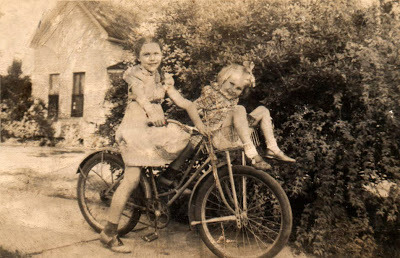 Florence Worthy Griner, my first cousin, was about to take a trip she had dreamed of for years. She was going down the Danube River with her sister, Carolyn. But days before they were to leave, Florence surprised everyone by leaving on her own solitary journey beyond this earth with all its roads and rivers, dreams and aspirations.
Florence Worthy Griner, my first cousin, was about to take a trip she had dreamed of for years. She was going down the Danube River with her sister, Carolyn. But days before they were to leave, Florence surprised everyone by leaving on her own solitary journey beyond this earth with all its roads and rivers, dreams and aspirations.Florence was the matriarch of a large family, and I can’t begin to comprehend the feelings of the children and grandchildren she left behind. I can’t imagine how her husband, Howard, feels without his wife to share his days and nights. I can only speak as a cousin to whom Florence mattered in more ways than she knew.
Though she was several years older, when we were children those few years felt like a lifetime. I was impressed with her independence as she came and went from Grandmother Ledford’s house in which she and Carolyn lived with their parents and Grandmother. Carolyn was only two years older than I was so it was Carolyn with whom I usually played. But the three of us together with neighborhood friends roller-skated on the paved sidewalk in front of Grandmother’s and the two houses beyond it. And on rare occasions Florence played paper dolls with us in the hayloft of the barn behind the house. But my special childhood memory of her is of the time she put me in the basket of her bicycle and took me for a ride. I felt so special. I still treasure the picture someone took of Florence on her bicycle with me in the basket, smiling.
I moved away from the south when I was 22 and only returned at Christmas, and often in the summer. I sometimes saw Florence on those trips home, but I want to write about my memories of one special time with her. It was 1985, and what was to be my last visit to Cairo before Mother’s death. Mother was visibly tired and my brother Mercer, who lived with her, was depressed. After cooking dinner for my brother Wyman—whom I called and still call Bubba—and his family, Mother was so tired she could hardly walk across the room. After they left, I insisted that she rest while I put the leftovers away and washed the dishes. “You act as firm with me as Florence acted with her mother when she was so sick.” Mother tried to say this in a complaining way, but I could tell that she was both pleased and relieved.
The next day Mother explained that Mercer was growing more depressed and paranoid and was afraid to drive them farther than the 13 miles to Thomasville. And he was more possessive than ever about her, the house, and the things in it. There were several things she wanted me to have so she slipped them into my suitcase when he was out buying cigarettes.
The emotional pain in the house was palpable. I felt broken-hearted for both of them.
But I felt like I couldn’t endure my visit without a respite, and was deeply grateful when Florence invited me to spend several days with her at her family vacation home on the Saint Marks River in Florida. Florence and I spent hours talking. Not idle talking to pass the time, but talking to earnestly communicate who we were and who we hoped to become. And I remember the sheer joy of lying in a hammock strung between two pine trees, watching clouds passing over in the blue sky.
Late afternoons we sat on the boat dock and drank bourbon and water, while watching the sunset, and waiting to see an old alligator that swam by at about the same time every evening. Once, when the sunset was especially spectacular, Florence called Howard in Tallahassee and told him to look out the window to see if it was as beautiful there. She didn’t want him to miss it.
Carolyn told me that with Florence gone, she feels a large empty place in her heart and I know this must be true. The sisters talked together every other day. My own sister, Harriet, born with cerebral palsy, was completely paralyzed and unable to speak a word. And though I loved Harriet dearly, and have found her to be an inspiration throughout my life, I longed for a sister who could talk with me. But I had my cousins, and with Florence’s passing, I find myself going back to memories of when we were children together at Grandmother’s, and Florence was so special because she was the oldest, and simply because she was Florence.
Published on May 30, 2008 15:47
May 18, 2008
A Correction
I read the following statement by son John Elder on his blog, and on the blog of my son Christopher Robison/Augusten Burroughs, author of A Wolf at the Table: “My brother, my mother, and I all agree on the essential truth of the book.”
John Elder evidently misunderstood me. I did not say that I agree with “the essential truth of the book.” I've not read A Wolf at the Table yet. I did agree with the following statement by John Elder as quoted by Ms. Patricia Cohen in her New York Times article: “We certainly agree that my father was frighteningly mean when he was drunk. And in those years, he was drunk every night, whenever he was home.”
Ms. Cohen also wrote: “This true self was so carefully hidden behind a public mask, Burroughs said, that no one outside the family ever glimpsed it.” I also agree with this statement by Chris.
I can say no more about the book at this time.
John Elder evidently misunderstood me. I did not say that I agree with “the essential truth of the book.” I've not read A Wolf at the Table yet. I did agree with the following statement by John Elder as quoted by Ms. Patricia Cohen in her New York Times article: “We certainly agree that my father was frighteningly mean when he was drunk. And in those years, he was drunk every night, whenever he was home.”
Ms. Cohen also wrote: “This true self was so carefully hidden behind a public mask, Burroughs said, that no one outside the family ever glimpsed it.” I also agree with this statement by Chris.
I can say no more about the book at this time.
Published on May 18, 2008 08:13
March 22, 2008
Reaching
When I went to the grocery store one day this week, the rack of greeting cards caught my attention. I immediately thought of choosing one for my life-long friend Lucille. This has happened many times in the months since she died, and each time I feel a sense of loss. Given how unhappy she was in the nursing home, and knowing that the circulation in her legs was so bad she was going to have to face the amputation of her feet, I knew she no longer wanted to live, but looked forward to going home to God. Still I miss her. And I miss being able to buy cards for her. Cards were one of the few things she still enjoyed and I enjoyed sending them. Until that day in grocery store this week I hadn’t realized what a gift it was to me to be able to do that. Being unable to buy and send her a card, I was moved to write the following poem:
Reaching
—for Lucille Williams, 1910-2007
The house is quiet.
I’ve not heard a single footstep overhead
Since early morning.
Outside the day is drenched.
Raindrops glisten on bare branches
And pock the river as it flows.
I’m lonely for you, Lucille.
You left this earth months ago and still
I write this note to you.
It’s not that I have much to say.
Snow is melting on the river’s far bank
Exposing patches of bare earth.
Mist blurs the mountainside.
Words not significant enough to span
The distance between our worlds
But adequate
To reach from heart to heart
When love propels them.
© Margaret Robison 2008
Reaching
—for Lucille Williams, 1910-2007
The house is quiet.
I’ve not heard a single footstep overhead
Since early morning.
Outside the day is drenched.
Raindrops glisten on bare branches
And pock the river as it flows.
I’m lonely for you, Lucille.
You left this earth months ago and still
I write this note to you.
It’s not that I have much to say.
Snow is melting on the river’s far bank
Exposing patches of bare earth.
Mist blurs the mountainside.
Words not significant enough to span
The distance between our worlds
But adequate
To reach from heart to heart
When love propels them.
© Margaret Robison 2008
Published on March 22, 2008 16:43
February 29, 2008
Looking Out the Same Window
For nearly twenty years, I've sat at my writing table mornings writing poems, and looking out the same window day after day. Some of the poems are included in books, some are published in literary journals, while others are displayed in the poetry box at the end of my wheelchair ramp. Many are filed away to be shared if or when the appropriate occasion arises. After the stroke that paralyzed my left side, I wrote poems focused on the stroke and my work recovering from that stroke. Many of those poems became part of the collection that made up my book Stroke, a book I'm happy to say has contributed to the understanding of the stroke experience for many stroke survivors and their families, friends, physicians, and occupational, physical, and speech therapists.
I continue writing poems at the same table, facing the same window. Looking out, I observe the changing seasons, the Deerfield River flowing past, or its surface frozen and piled high with snow, patterns in the snow changing by cold wind sweeping through the valley. I watch birds at my feeder and ducks floating on the water. Sometimes sea gulls soar over the river and hawks glide over the hill that rises across from it. There's no end to the activity, whether it's a single dry leaf trembling in a fall breeze, or clouds changing their shapes as I watch. Every day I see new things, or I see old things in new ways. I don't always write about what I see, but what I observe in nature always helps connect me to the deep places in my heart from which my poetry comes. Often I think of the scripture: “Be still and know that I am God.”
When not writing poetry or recording dreams and thoughts in my journal, I work on the memoir that I began to write over ten years ago. Each time I return to it, I find myself looking at my past in the context of the evolution of my consciousness that continues to change the way I look at everything including that past. What never changes-except to grow stronger in my heart and clearer in my mind-is the love that infuses all creation.
What We Know
The hill across the river
Has disappeared in fog.
By simply looking
I can't even tell that it's there.
Occasionally small clumps of ice
Piled with snow
Float down river.
Slowly.
Without my glasses
I could mistake each
For a splendid white duck.
Or a snow goose
That has lost its way
To grace me
With its brief appearance.
A car just passed out front.
Its tires splashed in the slush.
The snow is melting rapidly.
Though it's still deep.
And we have weeks of winter
Before spring comes.
But what we know that our senses
Or facts don't tell us!
Like the loving warmth I feel enfold me
In response
To the insistent longing in my heart-
Something inexpressible
But absolute
Sensed in my soul as I sit
In stillness and silence
This grey morning
Before the sun breaks through.
©2008Margaret Robison
A New Song
Islands of thin ice float
Down the river
While wisps of fog
Hang over them
Like so many angels
Accompanying each
On its journey.
I too am on a journey-
The journey of my awakening.
“Sing unto the Lord a new song,”
The Bible says. And I do.
I open my mouth and syllables
Of whispered praise pour forth
During this quiet time
Before the sun rises like laughter
To bless the hill with its gold.
“Sing unto the Lord a new song,”
The Bible repeats and morning
Repeats itself too-each day new
As a baby's first breath,
While more words of praise
Form in the my bones' marrow,
In my heart's most secret places,
And in the deep knowing
That tells me who I am.
“Sing unto the Lord a new song,”
The Bible says. And I do.
Mother, Father, God,
I could not do otherwise,
Being your daughter
Born anew each sunrise
With a burst of joy at the waking.
©2008Margaret Robison
I continue writing poems at the same table, facing the same window. Looking out, I observe the changing seasons, the Deerfield River flowing past, or its surface frozen and piled high with snow, patterns in the snow changing by cold wind sweeping through the valley. I watch birds at my feeder and ducks floating on the water. Sometimes sea gulls soar over the river and hawks glide over the hill that rises across from it. There's no end to the activity, whether it's a single dry leaf trembling in a fall breeze, or clouds changing their shapes as I watch. Every day I see new things, or I see old things in new ways. I don't always write about what I see, but what I observe in nature always helps connect me to the deep places in my heart from which my poetry comes. Often I think of the scripture: “Be still and know that I am God.”
When not writing poetry or recording dreams and thoughts in my journal, I work on the memoir that I began to write over ten years ago. Each time I return to it, I find myself looking at my past in the context of the evolution of my consciousness that continues to change the way I look at everything including that past. What never changes-except to grow stronger in my heart and clearer in my mind-is the love that infuses all creation.
What We Know
The hill across the river
Has disappeared in fog.
By simply looking
I can't even tell that it's there.
Occasionally small clumps of ice
Piled with snow
Float down river.
Slowly.
Without my glasses
I could mistake each
For a splendid white duck.
Or a snow goose
That has lost its way
To grace me
With its brief appearance.
A car just passed out front.
Its tires splashed in the slush.
The snow is melting rapidly.
Though it's still deep.
And we have weeks of winter
Before spring comes.
But what we know that our senses
Or facts don't tell us!
Like the loving warmth I feel enfold me
In response
To the insistent longing in my heart-
Something inexpressible
But absolute
Sensed in my soul as I sit
In stillness and silence
This grey morning
Before the sun breaks through.
©2008Margaret Robison
A New Song
Islands of thin ice float
Down the river
While wisps of fog
Hang over them
Like so many angels
Accompanying each
On its journey.
I too am on a journey-
The journey of my awakening.
“Sing unto the Lord a new song,”
The Bible says. And I do.
I open my mouth and syllables
Of whispered praise pour forth
During this quiet time
Before the sun rises like laughter
To bless the hill with its gold.
“Sing unto the Lord a new song,”
The Bible repeats and morning
Repeats itself too-each day new
As a baby's first breath,
While more words of praise
Form in the my bones' marrow,
In my heart's most secret places,
And in the deep knowing
That tells me who I am.
“Sing unto the Lord a new song,”
The Bible says. And I do.
Mother, Father, God,
I could not do otherwise,
Being your daughter
Born anew each sunrise
With a burst of joy at the waking.
©2008Margaret Robison
Published on February 29, 2008 16:52
February 10, 2008
Hometown News
This week my hometown newspaper, The Cairo Messenger, announced a rattlesnake roundup in a nearby town. A photograph of a rattlesnake ready to strike accompanied the article. Reading, I remembered times my mother wrote me about rattlesnake roundups in Cairo, and how men hunting them had come into her backyard wearing stove pipes on their legs because rattlesnake fangs could penetrate their leather boots. The rattlesnake roundups at that time were sponsored by Ross Allen, for whom the men capt...
Published on February 10, 2008 13:13
November 2, 2007
Celebrating Lucille
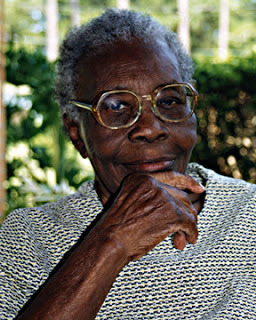
My lifetime friend, Lucille Williams, left this earth on September 23, 2007. She was 97. An African-
American woman, she cooked and cleaned for my family from the time I was 4 months old until I was a teenager. For the past 20 years we spent many hours talking on the phone. We talked about our daily lives, our families, friends, the weather. Arthritis made walking difficult for her. I was and still am in a wheelchair because of a stroke that paralyzed my left side. Often I said: "I wish I...
Published on November 02, 2007 11:12
May 24, 2007
The Angel By My Shoulder

Recently I received the following e-mail: "I was stunned by the picture of the angel by your shoulder on your website's home page. My mother was critically ill with cancer in 1970. I was 16 at the time. Very early one morning my mother awoke in her rented hospital bed in our family room, as she often did because of pain. As she sat up in bed, she heard a voice whisper very loudly over her shoulder from behind, "Your faith has made you whole." She always felt an angel had leaned over, as in yo...
Published on May 24, 2007 12:04
Margaret Robison's Blog
- Margaret Robison's profile
- 36 followers
Margaret Robison isn't a Goodreads Author
(yet),
but they
do have a blog,
so here are some recent posts imported from
their feed.



